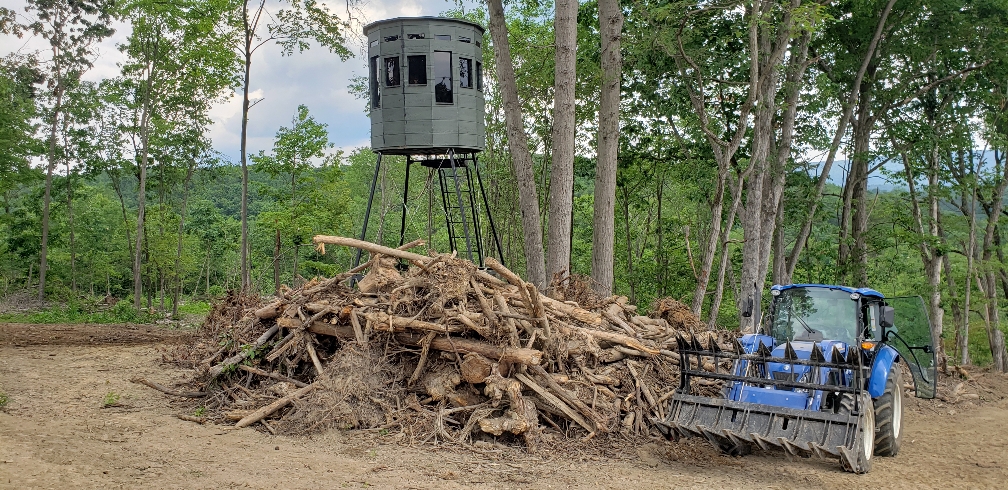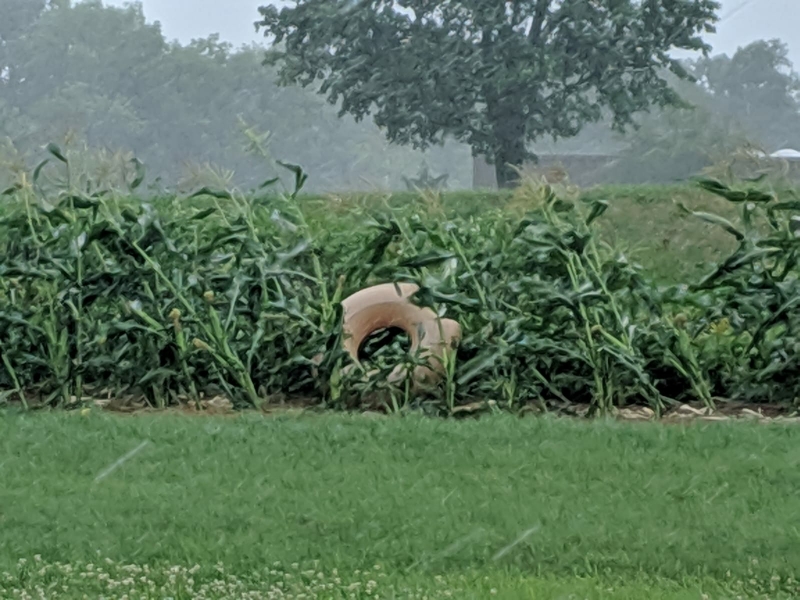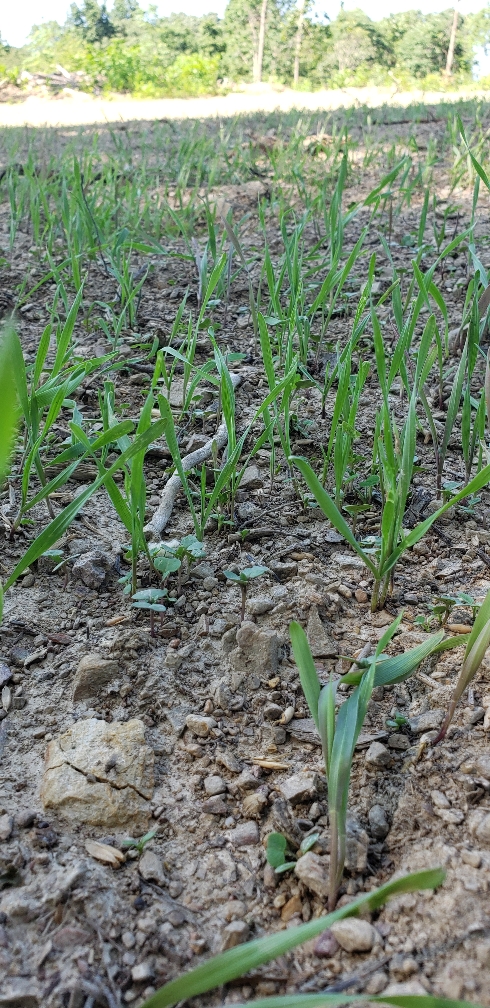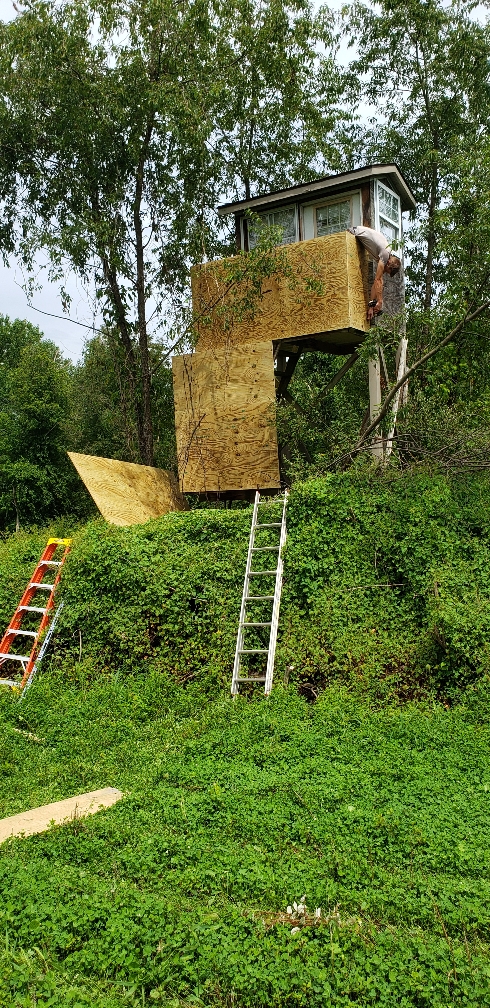jlane35
Well-Known Member
I heard somewhere that you should "brush in" your hunting location, so I "brushed" in my hunting blind.
What’s the goal? Being able to sneak away directly behind the pile after your sit?
I heard somewhere that you should "brush in" your hunting location, so I "brushed" in my hunting blind.
Yes. Being able to enter and leave a deer hunting blind unobserved is the number one most important things to heed when designing stand locations. This pile of logging debris will get overgrown with brush and saplings long before it rots down, guaranteeing a permanent screen at this location. A piece of treated plywood will be added underneath the upper part of the ladder to finish this screening project.What’s the goal? Being able to sneak away directly behind the pile after your sit?
Yes. Being able to enter and leave a deer hunting blind unobserved is the number one most important things to heed when designing stand locations. This pile of logging debris will get overgrown with brush and saplings long before it rots down, guaranteeing a permanent screen at this location. A piece of treated plywood will be added underneath the upper part of the ladder to finish this screening project.



I planted this oat, rye, ladino, MRC, DER, PTT, and GHR mix into powdery dust 12 days ago, right before a heavy rain. The oats and rye jumps right out of the gate while the brassicas lag on behind, and the clover isn't going anywhere, waiting on the next rain. This is why a grain component is so important in plot mixes.
I'm expecting to have enough browse. But if it gets taller than 8-10 inches I will mow it. Early rye planting really increases cold season winter yields due to an expanded and deeper root system.will you have enough browse on your rye and oats or will will clip it before the season?
I heard somewhere that you should "brush in" your hunting location, so I "brushed" in my hunting blind.
I've measured my oats at tall as 18" and they still get mowed off by winter. If I could have ever remembered the exclusion cage, I could have found out how tall they really got. I should move one over this weekend. In my area, oats go to number 1 after clover is about used up.I'm expecting to have enough browse. But if it gets taller than 8-10 inches I will mow it. Early rye planting really increases cold season winter yields due to an expanded and deeper root system.
The oats are unbeatable for the fall, but leave us with nothing for the winter here in Pennsylvania, so we often plant a mix of the two in one form or another. We get a tremendous amount of mid and late winter feed from our rye plots and the deer seem to prefer the green rye over newly emerging clover in early Spring.I've measured my oats at tall as 18" and they still get mowed off by winter. If I could have ever remembered the exclusion cage, I could have found out how tall they really got. I should move one over this weekend. In my area, oats go to number 1 after clover is about used up.
That's a good point. One year I had a really good stand of rye on my place into December with a few inches of powder snow on it. Deer on my place still took off for wintering areas and left it (and a bunch of freshly cut tree tops) all behind.The oats are unbeatable for the fall, but leave us with nothing for the winter here in Pennsylvania, so we often plant a mix of the two in one form or another. We get a tremendous amount of mid and late winter feed from our rye plots and the deer seem to prefer the green rye over newly emerging clover in early Spring.
Deer are so smart, yet when it comes to food sometimes I have observed them acting downright stupid. I'm guessing that because of their superior intelligence they take things to a level above what us dumb humans can figure out.That's a good point. One year I had a really good stand of rye on my place into December with a few inches of powder snow on it. Deer on my place still took off for wintering areas and left it (and a bunch of freshly cut tree tops) all behind.

Don't even ask, cause we're not sure either
Sent from my SM-G965U using Tapatalk
We made a new food plot on what formerly was the backside of an older hunting blind, so that meant the steps and porch were wide open to the field, trying to block some off with plywood, and the thing is 17' high to the floor.You got protesters comin?
If you have to do that again, look at getting a 6' roll of geotextile. It's light, durable, cheap, and UV resistant. And it only costs about 30 cents per foot. I've got a box blind that needs the legs wrapped yet this summer, and that's what I'm putting on there.We made a new food plot on what formerly was the backside of an older hunting blind, so that meant the steps and porch were wide open to the field, trying to block some off with plywood, and the thing is 17' high to the floor.
That's a great idea, and I may have to consider it to screen another blind that we have. The one thing is that I dislike loose material flapping in the wind, and another is that my time is worth more to me than the cost of the material, if I use treated plywood it will make the blind stronger and will probably last for the next 20 years. A lot of people use EPDM (rubber roofing) scraps for blind screening as a heavier product that lasts a little longer.If you have to do that again, look at getting a 6' roll of geotextile. It's light, durable, cheap, and UV resistant. And it only costs about 30 cents per foot. I've got a box blind that needs the legs wrapped yet this summer, and that's what I'm putting on there.
